GABA Supplements for Reducing Anxiety and Mood Swings
Introduction
In moments of stress or overwhelm, your brain relies on a delicate chemical balance to stay calm and grounded. One of the key players in this process is GABA — short for gamma-aminobutyric acid — your body’s primary inhibitory neurotransmitter.
Think of GABA as your brain’s natural “brake pedal.” 🧠💨 It slows down excessive activity, quiets mental chatter, and allows relaxation to settle in. But when GABA levels are too low, that brake system weakens — leading to anxiety, irritability, racing thoughts, and mood swings.
This is where GABA supplements and GABA-supporting nutrients come in. Although research is still developing, studies suggest that boosting GABA levels can help restore calm, emotional balance, and resilience in stressful times.
Let’s explore how GABA works, what science says about supplementation, and how to naturally support your brain’s calming chemistry. 🌸
Looking for supplements for Brain Fog? Click here.
🧠 What Is GABA and Why It Matters
GABA (gamma-aminobutyric acid) is a naturally occurring amino acid that acts as a neurotransmitter — a chemical messenger that helps your brain cells communicate.
While glutamate excites neurons and keeps you alert, GABA inhibits overactivity, restoring equilibrium in your nervous system.
In simple terms:
Too much glutamate = anxiety, restlessness, and overstimulation.
Enough GABA = calm focus, steady mood, emotional control.
💡 GABA keeps your nervous system from going into overdrive — it’s your internal peacekeeper.
🌬️ GABA’s Role in the Nervous System
Your brain constantly balances stimulation (excitatory signals) and relaxation (inhibitory signals). GABA is the master inhibitory neurotransmitter, responsible for:
Reducing neural excitability 🔋
Promoting relaxation and calm 🧘
Regulating mood stability 😊
Supporting deep, restorative sleep 😴
When GABA function is impaired — due to stress, poor diet, or sleep deprivation — your system can get stuck in “fight or flight” mode.
⚖️ GABA and Mood Regulation
GABA interacts with GABA-A and GABA-B receptors, which influence anxiety, motivation, and emotional tone. Many anti-anxiety and sleep medications (like benzodiazepines) work by enhancing GABA’s effects.
However, these drugs can cause dependency or drowsiness. Natural GABA support offers a gentler, sustainable approach — helping you achieve calm without sedation or fogginess.
😰 Signs of Low GABA Levels
When GABA activity is too low, your brain’s inhibitory “brakes” stop working efficiently, leading to overstimulation.
Common Signs of GABA Deficiency:
Constant worry or anxiety 😟
Feeling overwhelmed or restless
Racing thoughts
Muscle tension or tightness
Irritability and mood swings
Poor sleep or early waking
Cravings for alcohol or carbs (temporary calming effect)
🧩 Chronic stress, caffeine, alcohol, and sleep deprivation can all lower GABA levels over time.
🌿 How GABA Supplements Work

Here’s where things get interesting.
For decades, scientists debated whether GABA supplements could cross the blood-brain barrier (BBB) — the protective membrane that controls what enters your brain.
Recent evidence suggests that while GABA itself crosses the BBB minimally, it may still affect the brain indirectly via the gut-brain axis or by interacting with peripheral GABA receptors.
In short: you may not need GABA to enter the brain directly for it to have calming effects.
🧬 GABA and the Gut-Brain Axis
Your gut produces and communicates with neurotransmitters like GABA through the vagus nerve — the body’s main “calming highway.”
Supplemental GABA may enhance vagal tone and signal the brain to relax, creating a body-wide feedback loop of calm.
🧘 This means supporting your gut health also supports your emotional health.
🔬 Research Highlights
Several human studies show that GABA supplementation can reduce anxiety and improve relaxation:
2006 (Biofactors Journal): GABA intake reduced stress-related brain waves within 1 hour. Participants reported feeling calmer without sedation.
2011 (Journal of Clinical Nutrition): GABA-enriched oolong tea lowered markers of psychological stress.
2018 (Frontiers in Psychology): Oral GABA improved relaxation and reduced stress in healthy adults.
While the effects are moderate, they are consistent and measurable — especially for people under high stress.
🌼 Benefits of GABA Supplements
🌿 Reducing Anxiety
The most well-documented benefit of GABA is its ability to reduce stress and anxiety.
By binding to GABA-A receptors, it dampens excessive neural activity, leading to:
Fewer intrusive thoughts
Less muscle tension
Slower heart rate
Better control over emotional reactions
🧠 It’s not sedation — it’s serenity.
🌙 Supporting Sleep
GABA plays a major role in sleep onset and sleep quality. People with insomnia often have lower GABA levels in cerebrospinal fluid.
Supplemental GABA may help by quieting the mind before bed and promoting non-REM (deep) sleep.
🛏️ Try combining GABA with magnesium glycinate, L-theanine, or glycine for optimal nighttime calm.
💛 Easing Mood Swings
By stabilizing neural excitability, GABA helps buffer emotional highs and lows. This makes it especially helpful for individuals with:
PMS or perimenopausal mood swings
Bipolar tendencies (under supervision)
Stress-related irritability
💬 Many users describe GABA as creating “emotional smoothness” — the ability to feel without being overwhelmed.
🧩 Enhancing Focus and Relaxed Productivity
Interestingly, GABA can also improve focus when anxiety is reduced.
When the mind is calm but alert, concentration naturally increases. Studies show that GABA promotes alpha brain waves — the same patterns seen in meditation and deep focus.
🌸 Calm doesn’t mean sleepy — it means present.
⚗️ Natural Sources and GABA-Boosting Nutrients
If you prefer a food-first approach, several nutrients and foods can increase GABA levels naturally.
🥦 GABA-Rich Foods
Fermented foods (kimchi, sauerkraut, miso)
Brown rice germ
Tomatoes and spinach
Potatoes and sweet potatoes
Mushrooms
🧘 Fermentation enhances natural GABA content and supports gut health, amplifying the gut-brain connection.
🌿 Nutrients That Support GABA Production
| Nutrient | Function | Best Sources |
|---|---|---|
| Magnesium | Cofactor for GABA receptors | Pumpkin seeds, dark chocolate, spinach |
| Vitamin B6 | Needed for GABA synthesis | Bananas, chickpeas, salmon |
| Zinc | Modulates GABA receptor sensitivity | Nuts, seeds, oysters |
| Taurine | GABA analog and calming amino acid | Fish, eggs, supplements |
| L-Theanine | Increases GABA and alpha brain waves | Green tea, supplements |
💊 These nutrients help your brain naturally make and use GABA more effectively — ideal if you prefer not to take GABA directly.
Looking for supplements for Brain Fog? Click here.
🌬️ Breathwork and GABA: The Nervous System Reset
Breathwork activates the parasympathetic nervous system — the “rest and digest” mode — and can increase endogenous GABA levels.
🌫️ Try This GABA-Activating Breathing Exercise
Sit comfortably with your spine straight.
Inhale slowly through your nose for 4 seconds.
Hold your breath for 2 seconds.
Exhale gently through your mouth for 6 seconds.
Repeat for 3–5 minutes.
Studies show that slow diaphragmatic breathing boosts GABA levels in the brain by up to 25%.
💨 Combine this with GABA or L-theanine supplementation for an even deeper sense of calm.
Want to try Breathwork? Click Here.
😴 Combining GABA with Other Calming Supplements
To maximize the calming effects, GABA is often paired with synergistic nutrients that support similar pathways.
| Supplement | Synergy | Benefit |
|---|---|---|
| L-Theanine | Increases GABA and alpha brain waves | Relaxed focus |
| Magnesium Glycinate | Supports GABA receptors | Deep calm and better sleep |
| Taurine | GABA agonist | Reduces excitability |
| Glycine | Works alongside GABA for relaxation | Improves sleep depth |
| Ashwagandha | Reduces cortisol | Combines stress relief with calm focus |
💬 Stack example for anxiety relief:
Morning → L-theanine + Magnesium
Evening → GABA + Glycine or Taurine
🧘 Who Might Benefit from GABA Supplementation?
GABA supplements can be especially supportive for people who experience:
Chronic stress or burnout
Anxiety and racing thoughts
Sleep difficulties
PMS or menopausal irritability
Mood instability due to overwork or caffeine overload
However, GABA is not a replacement for professional treatment in clinical anxiety or bipolar disorders — it’s a supportive ally, not a cure.
⚖️ Dosage and How to Take GABA
💊 Common Dosage Range
| Goal | Dose | Timing |
|---|---|---|
| Mild anxiety | 100–200 mg | Once or twice daily |
| Sleep support | 200–500 mg | 30–60 min before bed |
| Stress relief | 100–300 mg | Morning or afternoon |
Start with the lowest effective dose, then gradually increase if needed.
⏰ Timing Tips
Take on an empty stomach or with a light snack.
Avoid right before driving — it can cause mild relaxation.
For best results, take consistently for 2–3 weeks.
⚠️ Safety and Side Effects
GABA is generally very safe and well-tolerated.
Possible mild effects:
Drowsiness (if dose too high)
Tingling or warmth in the face
Mild stomach discomfort
⚠️ Avoid combining GABA with:
Alcohol or sedative medications
High-dose melatonin (can amplify drowsiness)
Pregnant or breastfeeding women should consult their healthcare provider before using GABA.
🌸 GABA and Hormonal Mood Fluctuations
Estrogen and progesterone directly influence GABA receptor sensitivity. During PMS, perimenopause, or menopause, hormonal shifts can disrupt GABA function — leading to anxiety, irritability, and emotional volatility.
Supplementing with GABA or GABA-supportive nutrients can smooth hormonal mood swings, especially when paired with magnesium and vitamin B6.
💬 This is why calming herbal teas or supplements can feel extra effective during hormonal transitions — they help stabilize GABAergic tone.
🌈 GABA and the Gut-Brain Connection
Your gut microbiome produces GABA naturally. Certain beneficial bacteria, like Lactobacillus and Bifidobacterium, can synthesize GABA and communicate with your brain through the vagus nerve.
Probiotic strains like Lactobacillus rhamnosus have been shown to reduce anxiety by modulating GABA receptors in the brain (PNAS, 2011).
🌿 Translation: A calm gut creates a calm mind.
🧘 Real-Life Story
Case Example:
Laura, 34, worked in a high-stress corporate job. She often experienced anxiety, irritability, and poor sleep.
Her nutritionist recommended a calming stack:
200 mg GABA before bed
200 mg L-theanine in the morning
Magnesium glycinate daily
Within two weeks, Laura noticed:
Deeper sleep
Fewer mood swings
Calmer reactions to stress
💬 “I still feel emotions, but they don’t hijack my whole day anymore.”
💡 Natural Ways to Boost GABA Without Supplements
Even if you don’t take GABA directly, you can enhance your body’s own GABA production through lifestyle changes:
🧘 Mind-Body Practices
Yoga: Increases brain GABA levels by up to 27%.
Meditation: Promotes alpha waves and parasympathetic calm.
Nature exposure: Lowers cortisol, allowing GABA to function optimally.
🍽️ Nutrition
Eat magnesium-rich and fermented foods.
Limit caffeine and alcohol — both reduce GABA activity.
😴 Sleep Hygiene
Prioritize consistent sleep and dark evenings — GABA resets during rest.
🌿 Putting It All Together
GABA supplements offer a gentle, natural approach to calming an overstimulated nervous system. Whether you struggle with daily anxiety, emotional volatility, or restless sleep, supporting GABA levels can restore balance to your inner world.
✨ GABA Summary:
✅ Calms the nervous system
✅ Improves mood stability
✅ Enhances focus by reducing overthinking
✅ Promotes deep, restorative sleep
✅ Safe, non-addictive, and synergistic with natural nutrients
🌸 When combined with magnesium, breathwork, and balanced nutrition, GABA creates a foundation for emotional steadiness — a calm mind that’s ready for whatever the day brings.
Looking for online therapy ? Click Here.
📚 References
Abdou, A. M., et al. (2006). “Relaxation and immunity enhancement effects of gamma-aminobutyric acid (GABA) administration in humans.” Biofactors, 26(3), 201–208.
Nakamura, H., et al. (2011). “Effect of GABA-enriched oolong tea on stress and sleep.” Journal of Clinical Nutrition, 59(2), 161–165.
Kim, S. Y., et al. (2018). “Effects of oral GABA supplementation on stress and relaxation.” Frontiers in Psychology, 9, 1619.
Bravo, J. A., et al. (2011). “Ingestion of Lactobacillus strain regulates emotional behavior and GABA receptor expression.” PNAS, 108(38), 16050–16055.
Streeter, C. C., et al. (2010). “Yoga increases GABA levels in the brain.” Journal of Alternative and Complementary Medicine, 16(11), 1145–1152.
Shen, J. (2012). “The neurochemistry of meditation and its clinical effectiveness.” Medical Hypotheses, 79(4), 481–486.
Related Posts
-

Nootropics That Promote Calm and Rest
Explore the world of calming nootropics — natural brain enhancers that promote relaxation, better focus, and deeper rest. Learn how L-Theanine, magnesium, ashwagandha, and other adaptogens help balance your nervous system, reduce stress, and support restorative sleep.
-

Best Natural Supplement Stack for Sleep
Discover the best natural supplement stack for deep, restorative sleep. Learn how nutrients like magnesium, L-theanine, glycine, and calming herbs such as chamomile and ashwagandha work together to relax your body, calm your mind, and improve sleep quality—naturally and safely.
-

Combining L-Theanine and Magnesium for Sleep: A Calm Night, Naturally
Discover how combining L-Theanine and Magnesium can help you drift into deep, restorative sleep. Learn how this natural duo calms the mind, relaxes the body, and supports your nervous system—without grogginess the next morning.
-

How to Sleep Better After Intense Workouts
Struggling to fall asleep after a tough workout? Learn how to optimize your post-training recovery with nutrition, hydration, and science-backed sleep strategies. Discover how to calm your nervous system, balance hormones, and wake up fully recharged for your next session.
-

Ashwagandha and Valerian: A Bedtime Combo for Deep Rest and Emotional Reset
Discover the calming synergy of Ashwagandha and Valerian root, two natural sleep aids that help quiet the mind, ease anxiety, and promote deeper rest. Learn how this herbal duo supports the nervous system, balances stress hormones, and restores emotional peace — without next-day grogginess.
-

How to Create a Resilience-Boosting Diet
Discover how to build emotional and physical strength from the inside out with a resilience-boosting diet 🍎. Learn which foods stabilize your mood, how supplements like magnesium and omega-3s strengthen your stress response, and why pairing nutrition with breathwork and therapy creates lasting calm, focus, and vitality 🌿💪.
-

Best Teas and Herbal Blends for Calmness: Nature’s Way to Restore Inner Peace
Ashwagandha, the ancient adaptogenic herb, helps your body find balance during stress. Known as “Indian ginseng,” it supports cortisol regulation, boosts energy, and restores calm clarity. Discover how this powerful root promotes resilience, emotional balance, and steady vitality — one cup at a time. 🌸
-

Parenting and Emotional Strength: How to Raise Children Without Losing Yourself
Empathy is the bridge that connects hearts — the quiet power to understand, feel, and support another’s emotions without judgment. Learn how empathy strengthens relationships, enhances communication, and cultivates deeper compassion in everyday life. 🌿
-

How to Bounce Back from Public Failure: Reclaiming Confidence, Purpose, and Power
Visualization is more than imagination — it’s brain training for resilience. By picturing calm, success, or healing, you activate the same neural pathways as real experience. Learn how daily visualization rewires your brain for confidence, emotional balance, and recovery from stress. ✨
-

Coping with Financial Stress Through Resilience: How to Stay Grounded When Money Feels Tight
Body awareness is the foundation of emotional resilience. By tuning into your body’s signals — tension, fatigue, or calm — you learn to recognize stress before it overwhelms you. Discover how mindfulness, gentle movement, and breathwork can deepen your connection with your body and restore balance from the inside out. 🧘
-

How to Stay Positive During Chronic Illness: A Guide to Emotional Strength and Hope
Creativity is more than art — it’s a form of healing. Whether through painting, writing, music, or small acts of expression, creativity helps release emotion, calm the nervous system, and reconnect you to joy. Discover how to use creativity as a tool for emotional balance, resilience, and self-discovery. 🌿
-

Resilience Tips for Caregivers: How to Stay Strong While Caring for Others
Joy isn’t the absence of pain — it’s the quiet strength to find light even in challenging times. Cultivating joy through small daily moments restores balance, releases stress, and reminds you of life’s beauty. Learn how to reconnect with authentic happiness, rebuild emotional energy, and nurture your nervous system through gratitude, presence, and play. 🌿
-

Building Resilience After a Breakup: How to Heal, Rebuild, and Rise Stronger
Social connection is one of the strongest predictors of emotional resilience. During difficult times, genuine relationships act as anchors — calming the nervous system, reducing stress hormones, and helping you regain perspective. Learn how cultivating real human connection can strengthen your mind, heart, and overall well-being. 🌿
-

How to Stay Emotionally Strong During Job Loss
Your emotions are powered by brain chemistry — a delicate balance of neurotransmitters like serotonin, dopamine, and cortisol. When these chemicals work in harmony, you feel calm, focused, and resilient. Learn how daily habits, nutrition, and mindfulness can support your brain chemistry and boost emotional well-being naturally. 🌿
-

The Role of Hormones in Emotional Stability: How Your Chemistry Shapes Your Calm
Hormones shape more than your body — they shape your emotions, resilience, and sense of calm. From cortisol to serotonin, these chemical messengers influence how you react to stress, connect with others, and recover from challenges. Learn how to balance your hormones naturally to build lasting emotional stability and harmony within. 💫
-

Mitochondria and Emotional Energy: The Cellular Power Behind Your Mood
Breathwork is one of the most powerful tools for emotional regulation and cellular balance. Through intentional breathing, you can calm your nervous system, increase oxygen flow to the brain, and even support mitochondrial energy. Learn how conscious breathing connects body and mind — transforming stress into presence and emotional strength. 🌿
-

Inflammation and Its Impact on Mood Resilience: The Silent Link Between Body and Mind
Inflammation doesn’t just affect the body — it impacts the mind. Chronic inflammation alters brain chemistry, depletes serotonin, and makes emotional recovery harder. Learn how calming inflammation through nutrition, mindfulness, and sleep can restore balance, resilience, and a renewed sense of emotional strength. 💫
-

How Antioxidants Protect Emotional Well-being: The Hidden Link Between Oxidative Stress and Mental Health
Antioxidants do more than protect your body — they defend your mind. By neutralizing oxidative stress, antioxidants support serotonin, dopamine, and brain energy pathways that keep you calm, focused, and emotionally balanced. Discover how foods like berries, green tea, and dark chocolate nourish your brain, boost mood, and strengthen resilience from the inside out. 🌿✨
-

The HPA Axis and Emotional Health: The Hidden Bridge Between Stress and Mind
Neuroplasticity — the brain’s ability to rewire and adapt — is the foundation of emotional healing and resilience. When you face stress, trauma, or change, your neural pathways can reshape themselves to support new patterns of calm, focus, and self-awareness. Learn how daily practices like mindfulness, therapy, and breathwork strengthen neuroplasticity to transform emotional pain into personal growth. 🌸
-

Why Cortisol Control Is Key to Resilience: Mastering Stress to Build Emotional Strength
Controlling cortisol — the body’s main stress hormone — is the secret to lasting resilience. When cortisol levels stay balanced, your mind becomes clearer, emotions steadier, and energy more sustainable. Learn how breathwork, mindset shifts, adaptogens, and daily rhythms can help you calm your stress response and build true inner strength. 🌞💪
-

Dopamine’s Influence on Motivation and Recovery: Reigniting Drive and Balance
Healthy relationships are the foundation of emotional balance and resilience. Whether romantic, familial, or platonic, genuine connection releases dopamine, serotonin, and oxytocin — the brain’s “bonding trio” — helping us feel secure, motivated, and seen. Learn how trust, empathy, and communication not only strengthen your connections but also reshape your nervous system for deeper emotional well-being. 🌿🤝
-

The Role of Serotonin in Resilience: How This “Mood Molecule” Shapes Emotional Strength
Serotonin — often called the “resilience molecule” — plays a vital role in how we handle stress, regulate mood, and recover from emotional challenges. Beyond happiness, this powerful neurotransmitter helps balance the gut-brain axis, stabilize the nervous system, and support emotional flexibility. Learn how nutrition, sunlight, mindfulness, and adaptogens can naturally boost serotonin and strengthen your emotional resilience. 🌞🧠
-

How Neuroplasticity Supports Emotional Growth: Rewiring the Brain for Resilience
Neuroplasticity is the brain’s built-in power to grow, adapt, and heal — and it’s the foundation of emotional transformation. Every mindful breath, compassionate act, or reframed thought strengthens new neural pathways that support resilience and self-awareness. Learn how your brain rewires through daily habits, helping you turn emotional challenges into opportunities for growth and calm. 🌿
-

Tai Chi and Adaptogens for Mind-Body Balance: The Art of Harmonizing Energy and Resilience
Alchemy isn’t just an ancient science — it’s a timeless symbol of transformation and inner balance. By blending the physical and spiritual, alchemy teaches us that change begins from within. Just as metals are refined into gold, we too can transmute emotional pain, stress, and chaos into clarity and strength through mindful practice and self-awareness. 🌙✨
-

Cold Therapy and Emotional Control: Training the Mind Through the Body
Cold therapy isn’t just for athletes — it’s a tool for emotional mastery. By exposing your body to controlled cold, you train your nervous system to stay calm under stress, improving focus, mood, and resilience. This article explores the science of cold exposure, its impact on hormones and the vagus nerve, and how ice baths and cold showers can help you build emotional control, one breath at a time. 🧊🧘♂️
-

How Music Influences Emotional Recovery: The Healing Soundtrack of the Mind
Neuroplasticity — the brain’s ability to rewire and heal itself — is at the heart of emotional recovery. Through mindful habits, music, therapy, and consistent mental stimulation, your brain can form new connections that support resilience and well-being. Discover how neuroplasticity turns pain into growth, helping you rebuild balance, focus, and emotional strength. 🌿
-

Nature Therapy for Building Resilience: Reconnecting With the Healing Power of the Earth
Nature therapy helps rebuild emotional resilience by reconnecting you with the healing rhythms of the Earth. From forest walks to sunlight exposure, nature restores balance to your nervous system, lowers stress hormones, and teaches emotional adaptability. Learn how spending time outdoors can enhance mental clarity, calm anxiety, and awaken your natural capacity to heal. 🌞
-

Breathwork Techniques That Pair with Supplements: The Ultimate Synergy for Stress Relief and Mental Clarity
Breathwork and supplements create a powerful mind-body synergy for stress relief, focus, and energy. By combining intentional breathing with adaptogens, nootropics, and calming nutrients, you can naturally regulate cortisol, sharpen mental clarity, and boost emotional balance. This guide explores the best breathwork techniques and supplement pairings to help you feel centered, calm, and energized from the inside out. 🌿
-

Why Cortisol Balance Matters for Emotional Strength
Balancing cortisol — your body’s main stress hormone — is essential for emotional resilience. When cortisol is chronically high, your mind stays stuck in survival mode, leading to fatigue, anxiety, and emotional instability. This article explores how nutrition, supplements, breathwork, and therapy can help restore healthy cortisol rhythms, regulate the nervous system, and strengthen your ability to handle life’s challenges with calm focus and emotional strength. 🌿
-

Best Supplements for Students During Exam Season: Focus, Energy, and Memory Support
Studying late into the night? Learn which natural supplements can boost focus, memory, and mental stamina during exam season — without the crash. From omega-3s to Bacopa and Rhodiola, discover your brain’s ultimate exam support stack. 🎓🧠
-

Natural Memory Boosters for Seniors: How to Keep Your Mind Sharp and Focused
Stay mentally sharp and confident as you age. Discover science-backed natural supplements and lifestyle habits that boost memory, focus, and brain longevity for seniors. 🌿🧠
-

The Link Between Stress, Cortisol, and Memory Loss
Chronic stress can quietly erode your memory — and cortisol is the key culprit. Learn how stress hormones affect the brain, why the hippocampus shrinks under pressure, and how natural strategies can help you restore memory and mental clarity. 🧠✨
-

How to Build a Daily Supplement Routine for Memory Health
Want to sharpen your memory and stay mentally clear? Learn how to build a daily supplement routine for memory health — from morning focus to nighttime brain repair. Discover science-backed nutrients that boost recall, focus, and long-term cognitive resilience. 🧠🌿
-

Top 5 Natural Supplements for Memory Recall and Focus
Looking to boost memory and concentration naturally? Discover the top 5 supplements — Bacopa, Ginkgo Biloba, Lion’s Mane, Rhodiola, and Phosphatidylserine — that enhance focus, recall, and long-term brain health. 🧠✨
-

Top Supplements to Balance Mood Naturally
From omega-3s to adaptogens, discover the top natural supplements proven to support emotional balance, reduce stress, and promote inner calm — safely and effectively. 🌿✨
-

Can Omega-3 Fatty Acids Help with Mood Disorders?
Omega-3 fatty acids do more than support heart health — they can help balance mood, reduce depression, and calm anxiety. Discover how EPA and DHA nourish your brain, fight inflammation, and support emotional well-being from within. 🌊🧠
-

Vitamin D and Mood: The Sunshine Vitamin for Emotional Balance
Could the key to emotional balance be as simple as a little sunlight? Discover how vitamin D — the sunshine vitamin — influences serotonin, reduces inflammation, and helps you feel more positive and resilient year-round. ☀️💛
-

The Role of Magnesium in Reducing Irritability and Low Mood
Feeling on edge or emotionally drained? Magnesium could be the missing link between your body and your mood. Discover how this essential mineral reduces irritability, balances neurotransmitters, and helps your nervous system find calm again. 🌿✨
-
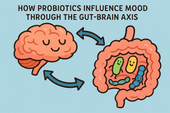
How Probiotics Influence Mood Through the Gut-Brain Axis
Discover how probiotics can do more than support your digestion—they can actually uplift your mood. This article explores the fascinating gut-brain axis and how balancing your gut bacteria through probiotics may help reduce anxiety, improve emotional stability, and support long-term mental well-being. 🌿🧠
-
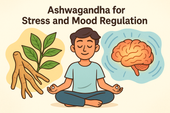
Ashwagandha for Stress and Mood Regulation
Discover how Ashwagandha, the powerful adaptogenic herb 🌿, helps your body manage stress and regulate mood. Learn how it balances cortisol, boosts GABA and serotonin, and supports emotional stability — helping you feel calm, focused, and resilient every day.
-

St. John’s Wort: Natural Support for Mild to Moderate Depression
Discover how St. John’s Wort, the “sunshine herb” 🌼, naturally supports mild to moderate depression. Learn how it boosts serotonin, balances mood, and promotes emotional resilience — with research showing its effectiveness compares to antidepressants, but with fewer side effects.
-
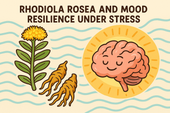
Rhodiola Rosea and Mood Resilience Under Stress
Discover how Rhodiola rosea helps your body adapt to stress 🌿. Learn how this powerful adaptogen balances cortisol, supports serotonin and dopamine, and strengthens emotional resilience — helping you stay calm, focused, and energized under pressure.
-

Chamomile and Lavender: Herbal Calm for Emotional Fluctuations
Discover how chamomile and lavender bring calm to emotional ups and downs 🌿. Learn how these two soothing herbs balance your nervous system, ease anxiety, and support restful sleep — naturally helping you find peace and emotional stability.
-
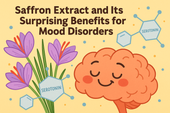
Saffron Extract and Its Surprising Benefits for Mood Disorders
Discover how saffron extract — the golden spice of joy 🌸 — can naturally support mood balance, ease anxiety, and lift mild depression. Learn what science says about its serotonin-boosting power, the ideal dosage, and how this ancient remedy compares to modern antidepressants.
-
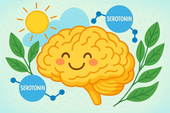
5-HTP and Serotonin: A Natural Path to Lifting Mood
Discover how 5-HTP naturally boosts serotonin 🌞 — the neurotransmitter behind mood, sleep, and emotional balance. Learn how this plant-derived compound supports happiness, reduces anxiety, and improves rest by helping your brain create more serotonin the gentle, natural way.
-
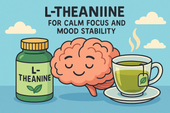
L-Theanine for Calm Focus and Mood Stability
Discover how L-theanine, the calming compound found in green tea 🍵, promotes focus, relaxation, and mood stability. Learn the science behind how it balances neurotransmitters, reduces stress hormones, and enhances clarity — helping you stay centered, calm, and productive without sedation.
-
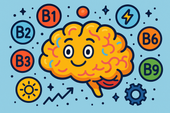
B Vitamins and Brain Chemistry: Supporting Energy and Emotional Balance
Discover how B vitamins power your brain chemistry ⚡. Learn how B6, B9, and B12 support serotonin, dopamine, and energy production — helping boost focus, mood, and emotional balance. From diet to supplements, explore how this vital nutrient group keeps your mind resilient and your energy steady.
-

N-Acetyl Cysteine (NAC) and Mood Disorders: What the Research Says
Learn how N-Acetyl Cysteine (NAC) supports brain health and mood balance 🧠. Discover how this antioxidant helps reduce oxidative stress, regulate glutamate, and improve emotional stability in depression, bipolar disorder, and anxiety — backed by cutting-edge psychiatric research.
-

Supplements for Bipolar Disorder: What May Support Stability
Discover the best supplements for bipolar disorder 🌿 that may support emotional stability and brain health. Learn how nutrients like omega-3s, magnesium, vitamin D, and NAC can help reduce inflammation, balance neurotransmitters, and complement traditional treatment safely.

















































